Now viewing articles in the category Recommended Reading.
-
Where Montessori Meets Wellness
September 27th, 2024
Where Montessori Meets WellnessAt its core, Montessori education is about preparing the whole child for life. What does this entail in today’s world?It means empowering children with a foundation of wellness practices that can help them build resilience by boosting their physical, emotional, and m...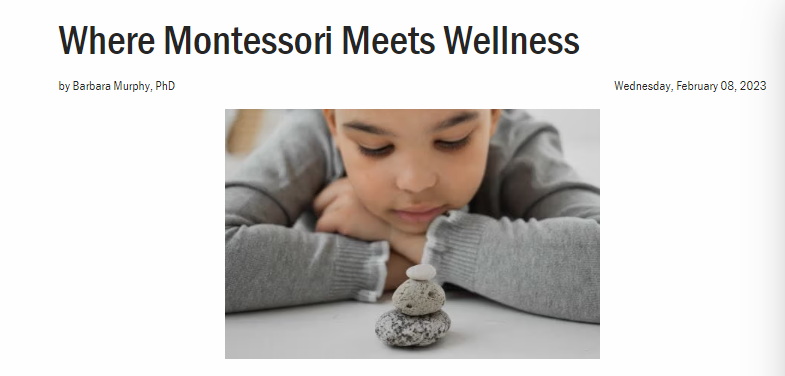 Posted in: Recommended Reading
Posted in: Recommended Reading -
Six Ways to Respond to Your Kids’ Big Feelings
September 20th, 2024
 When adults help children feel heard, it helps everyone feel less distressed and more calm.
When adults help children feel heard, it helps everyone feel less distressed and more calm.By Jessica L. Borelli, Stacey N. Doan | March 17, 2022
As parents, one of our greatest motivations is to protect our children from pain and suffering—in essence, from negative emotions. Nonetheless, despite our best efforts, our children will be disappointed, feel fear and pain, and have tremendous loss and grief. But this isn’t necessarily a bad thing.Posted in: Recommended Reading -
Grace
March 29th, 2024
Grace and Courtesy in Montessori January 6, 2024 By Gabrielle Kotkov Grace and Courtesy is a fundamental aspect of the Montessori curriculum. It is an essential part of Montessori philosophy, which emphasizes the importance of respect, empathy, and kindness. Grace and C... Posted in: Recommended Reading
Posted in: Recommended Reading -
Family Vacationing Made Easier
March 8th, 2024
Family Vacationing Made EasierTraveling with children. "You don't have to go far or plan a big, expensive vacation to see great stuff. In fact, some of the greatest places may be right around the corner."—Joanne O'Sullivan, 101 Places You Gotta See Before You're 12! ... Posted in: Recommended Reading
Posted in: Recommended Reading -
How Montessori Education Creates Resilient, Competent Adults
February 16th, 2024
“The only constant in life is change.”—Heraclitus It’s been over two millennia since Heraclitus penned his famous quote, and not only is change still a constant, it’s picked up its pace. Today’s children will work in jobs that don’t exist yet, working to solve problems laden with incr... Posted in: Recommended Reading
Posted in: Recommended Reading -
Saving Our Children from Nature-Deficit Disorder
February 2nd, 2024
Last Child in the Woods Saving Our Children from Nature-Deficit Disorder In this influential work about the staggering divide between children and the outdoors, child advocacy expert Richard Louv directly links the lack of nature in the lives of today's wired generation—he calls it...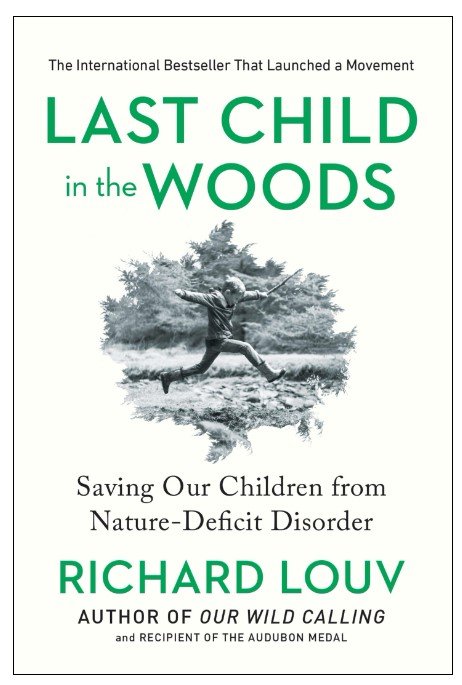 Posted in: Recommended Reading
Posted in: Recommended Reading -
How to connect with children
January 26th, 2024
Anchor Light Therapy CollectiveOct 14, 2022Whether you’re a veteran parent, a new mom or dad, or building a kids’ baseball team, there’s one thing we all have in common – learning to connect with children.However, with busy jobs, extracurricular activities, and other responsibilities, you ma...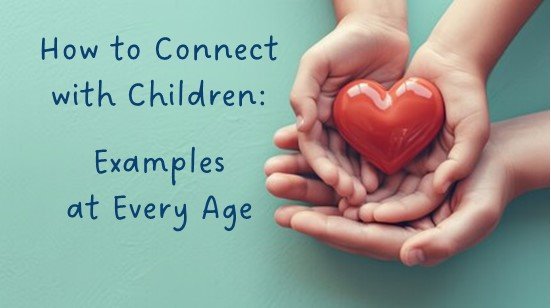 Posted in: Recommended Reading
Posted in: Recommended Reading -
Things to remember when comparing your child to others
January 19th, 2024
How We Montessori Blog Post"We all want the best for our children but over time I've learnt that comparing our children is not helpful, it can be potentially harmful, we need to respect each child for where they are at and to meet them right there."Here are a few things that I try to remember when... Posted in: Recommended Reading
Posted in: Recommended Reading -
5 Tips to Talk to Children about Difficult Topics (When You Least Expect It)
January 12th, 2024
by Neha Vaze, MPH, MAT In the middle of making dinner one night, my 7-year-old son says, “Did you know that all the polar bears are dying?” Stopping in my tracks, I took a deep breath. I wondered whether we would end up talking about climate change, ice caps melting, or greenhouse gasses. (Or a...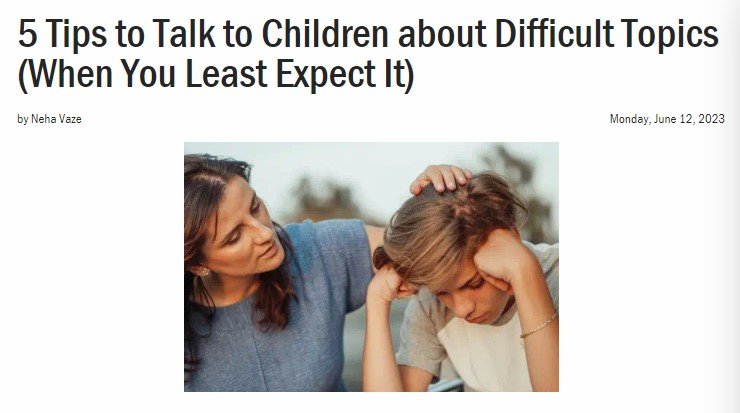 Posted in: Recommended Reading
Posted in: Recommended Reading -
Managing Daily Transitions - Routines in a typical day.
December 30th, 2023
by Jane M. Jacobs"The family home, like the Montessori classroom, is a social environment. Children learn to function in the world according to what they experience on a daily basis at home and school. As parents we often forget that the patterns we establish are the foundation for our children's ab... Posted in: Recommended Reading
Posted in: Recommended Reading -
The Third Plane of Development: Ages 12-18 - Montessori Philosophy
December 8th, 2023

"The third plane of development is the period of adolescence and marks the end of childhood. Youth in the early years of the third plane of development are much like their counterparts in the first plane; they can be self-absorbed, they need adequate food and sleep to sustain rapid growth, and they need time to “just be.” Learning and mental development may even slow down as more time is spent on their own, with friends, and eating and sleeping."
Posted in: Recommended Reading -
Courage
December 1st, 2023

"Encouraging curiosity and courage is one of the most powerful strengths of an authentic Montessori education. By preparing young people to tackle the world’s problems from a place of practiced curiosity, we can feed the next generation with valuable skills. By giving them explicit opportunities to build courageous personalities, Montessori gives the next generation the strength to make this word a better place for all"
Posted in: Recommended Reading -
The Awakened Holiday: How to Guide Your Family Through Routines with Intention
November 24th, 2023
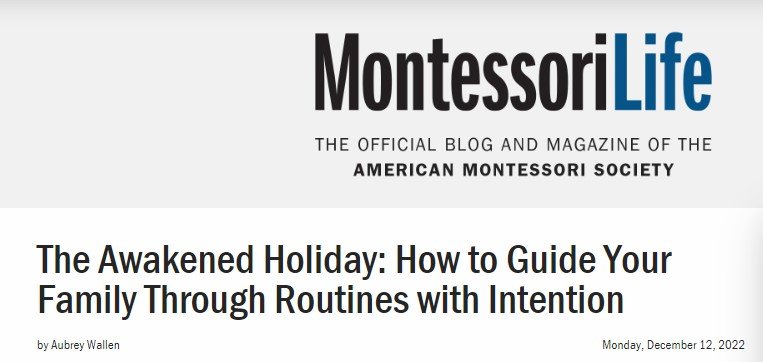
It is no secret that while this time of year is sacred for many reasons, it often comes with a hefty dose of burnout for parents. To help with the overwhelming nature of our many holiday routines, we can use our intention as a tool to help make (and keep) the season bright. Intention can create space for us to relax into the present moment and be joyful during the routines we hold so dear. Intentions give us a bottom line so we can focus and prioritize. Things that do not support our intention can be passed over, and our purpose becomes clear. Placing our focus on our decided intentions can reduce overwhelming moments and allow for a heightened sense of peace, presence, and power as we move through our routines.
Posted in: Recommended Reading -
Grace and Courtesy, Beyond Please and Thank You
November 17th, 2023

Parents want children to be polite, kind, and civilized. But what does it take to foster that outcome? Mammals, especially humans, are social learners. We gain knowledge from our environment and from other people, especially from those whom we love. Unfortunately, we learn both antisocial as well as pro-social behaviors by watching others.
So if there is anything you want your child to know how to do, or a way you want him or her to behave, you should first model it, then show him or her how to do it, offer lots of opportunities for practice, and finally, hold the child accountable.
Posted in: Recommended Reading -
Talking Respectfully to Your Children
October 27th, 2023
Montessori Moment... Talking Respectfully to Your Children by Jane Jacobs "Learn to Look and Listen - Montessori stresses the importance of carefully observing a child as he goes about his work. This is one of the ways we can show respect for the child, another major premise of th...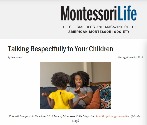 Posted in: Recommended Reading
Posted in: Recommended Reading








